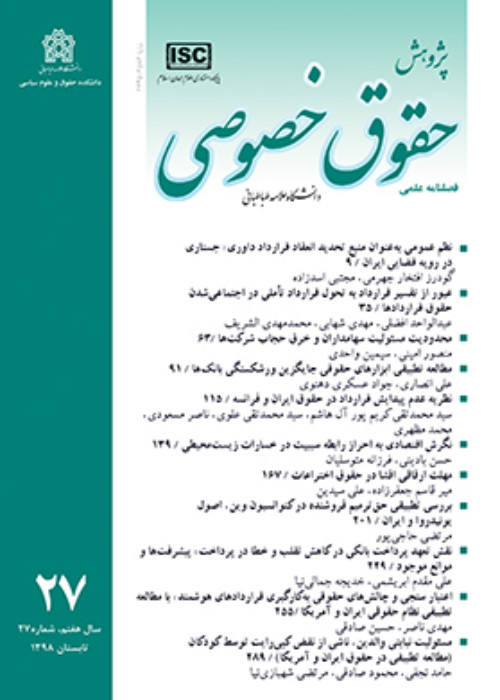Regulation and its objectives in the territory of director's general duties in joint-stock company (study in English and Iranian Law)
Today, one of the main players in the economy are companies. These entities are dependent on real persons to play their role, and these persons (directors) act as a member of the company's body. The importance of the company board of directors is that it can be called the executive branch of the company or the strategic government of the company. The management of the company's affairs according to the law and after that according to the will of the shareholders, has been entrusted to this organ, and following the assumption of this duty by the director, duties and powers as well as benefits have been defined for them according to the law, which are necessary for exercising the powers of the directors.Rulemaking in the field of duties and powers of directors in various legal systems is foreseen to achieve a goal that is in line with the goal of establishing the company. In fact, the purpose of establishing a company is to bring together multiple economic players with conflicting interests in order to achieve the common goal of making profit, and since the management of this group is entrusted to directors, the management goal must be determined and be available the necessary tools to achieve this common goal to them. Determining the general duties of directors through regulation is to determine the direction and create transparency for directors.
In this research, the main question is what policies the legislator pursues from regulation in this subject? And how did the Iranian and English legislators act in this regard? Also, this article tries to answer the above questions by descriptive-analytical method and comparative study of Iranian and English law.
In this research, a descriptive-analytical method with a comparative view has been used; In this way, first the general duties of directors are explained in in English and Iranian law, and then, with legal reasoning methods, The goals of establishing rules related to the general duties of directors in Iranian law are analyzed and examined.
In English law, the legislator has assigned a role beyond that of a trustee in the field of duties of managers. Therefore, it has predicted duties for the managers in order to achieve the three goals of "preventing conflict of interest", "protecting the company's interests" and "improving the company's status or improving the company's position".The first risk that arises in the relationship between the company and the directors is the misuse of their position in controlling the financial resources of the company, including property, reserves and credit. Therefore, considering the director as a trustee in the internal relations of the company and applying the guarantee of violation executions from this position can be very effective in solving the conflict-of-interest problem. This goal is provided by foreseeing the duty of avoiding the situation of conflict of interest and disclosing the acquisition of interest. One of the shortcomings of the legislation in this field in Iranian law is the failure to require managers to disclose the acquisition of profit. Of course, Article 129 of the legal bill to amend a part of the Commercial Law of 1968 in the transactions of the director with the company, foresees such a task for the board of directors, not the beneficiary director.The purpose of protecting the interests of the company is that the directors, by exercising the necessary care and caution, avoid losses to the company and the loss of its property, financial resources and reserves. This goal is achieved through various tasks. These duties include exercising independent votes or Duty exercise independent judgment, and Duty to act within powers. In Iranian law, by accepting the fiduciary duty for managers, we must accept that the goal of protecting the interests of the company is fulfilled to some extent.In the new law of British companies (2006), the legislator sought an approach to solve the problem of companies in advancing their goals. In this regard, the task of promoting the success of the company was predicted. The task of promoting the success of the company creates requirements for the director beyond the observance of trust, the non-compliance of which creates responsibility for the manager. In other words, the fiduciary duty creates a negative obligation for the director, but the duty to promote the success of the company creates a positive obligation. Positive commitment means improving the company's current situation.It can be inferred from the general duties of managers in English law that the goal of the legislator is to deal with the stagnation of companies and to oblige directors to make changes in their affairs, but this is not inferred from the total regulations governing the laws of Iranian companies.
Like the English legislator in setting the general duties of directors, the Iranian legislator must pursue the three goals of "resolving the conflict of interest", "preserving the existing interests of the company" and "promoting the position of the company". The first two goals can be achieved despite the shortcomings of the directors' fiduciary duty, but the third goal is not achieved with this duty; because the duty of fiduciary is to maintain the current situation and its promotion needs to be regulated. In English law, the achievement of this goal is pursued with the task of "promoting the success of the company", but in Iranian law, the legislator has not paid attention to policy-making in this subject.Therefore, in amending the existing regulations, attention should be paid to the policy of promoting the company's position and existing status, and rules should be made in the field of general duties of managers according to Iran's legal system.
- حق عضویت دریافتی صرف حمایت از نشریات عضو و نگهداری، تکمیل و توسعه مگیران میشود.
- پرداخت حق اشتراک و دانلود مقالات اجازه بازنشر آن در سایر رسانههای چاپی و دیجیتال را به کاربر نمیدهد.


